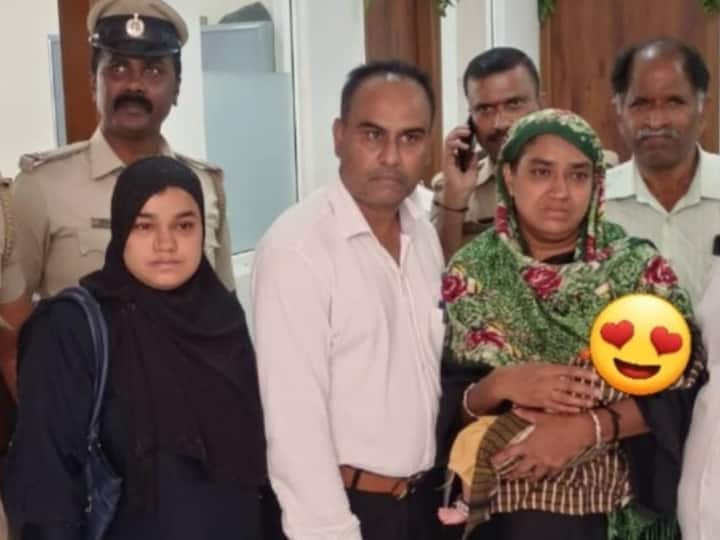Bangalore Child Kidnapping: Bangalore Police rescued a 40-day-old baby girl on Saturday and handed her over to her family members. It was reported that a woman had abducted the child from a house in Kalasipalya. Police identified the accused as Nandini alias Ayesha, a resident of Shivajinagar and Mulbagal in Kolar.
The baby’s mother, Fareen Begum, stated in her complaint to Kalasipalya Police that she had come to her maternal home for delivery and was staying there. She had fed the baby in the morning and fell asleep in the hall, only to wake up and find the child missing.
Suspicion led to police notification
After the family contacted authorities in the afternoon, police alerted the control room, which sent messages to all police stations in Bangalore. Meanwhile, a woman on the street noticed Nandini struggling to handle a crying baby. When asked what she had fed the child, Nandini replied, “Upma and milk.” The woman became suspicious, knowing no mother would feed upma to a newborn, and informed neighbors, who then alerted the police control room.
Child reunited with mother within hours of kidnapping
Police detained Nandini and discovered she had stolen the child from a lane near Durgamma Temple in Kalasipalya. The baby was handed back to her mother within hours of the incident. Another woman in the area had breastfed the child due to hunger. Kalasipalya Police contacted Magadi Road Police, who took the accused and child into custody before reuniting the baby with her mother.
Also Read:
Kalasipalya
Kalasipalya is a bustling neighborhood in Bangalore, India, known for its vibrant markets and historical significance. The area once housed a prominent fort (“Kote”) and gate (“Palya”) during the reign of Kempe Gowda I, the founder of Bangalore in the 16th century. Today, it is a commercial hub, famous for its wholesale markets, traditional shops, and cultural diversity.
Shivajinagar
Shivajinagar is a historic neighborhood in Bangalore, India, named after the 17th-century Maratha warrior king Chhatrapati Shivaji. Established during the British colonial era, it became a prominent commercial and residential area, known for its bustling markets and cultural diversity. Today, it remains a vibrant hub, blending traditional markets, modern developments, and landmarks like the Shivaji Statue at the railway station.
Mulbagal
Mulbagal is a historic town in Karnataka, India, known for its cultural and religious significance. It was an important center during the Vijayanagara Empire (14th–16th centuries) and is home to the ancient Kolaramma Temple, dedicated to the goddess Kolaramma. The town’s name is derived from “Mudalabagilu,” meaning “eastern gate,” as it served as a key eastern entry point to the Vijayanagara Kingdom.
Kolar
Kolar is a historic city in the southern Indian state of Karnataka, known for its rich cultural heritage and gold mining history. It was once part of the ancient Ganga Dynasty and later ruled by the Cholas, Vijayanagara Empire, and the British. Key attractions include the Kolaramma Temple (over 1,000 years old) and the nearby Kolar Gold Fields, which were among the world’s deepest gold mines until their closure in 2001.
Durgamma Temple
The **Durgamma Temple** is a prominent Hindu temple dedicated to Goddess Durga, located in Bangalore, Karnataka. It is believed to have been built several centuries ago and is a significant spiritual site for devotees, especially during the annual festival of Navaratri. The temple is known for its vibrant rituals and serves as a cultural hub for the local community.
Magadi Road
Magadi Road is a major arterial road in Bangalore, India, historically significant as an ancient trade route connecting the city to the town of Magadi. It played a vital role in commerce and transportation during the British colonial era. Today, it remains an important thoroughfare, known for its bustling markets and cultural diversity.






